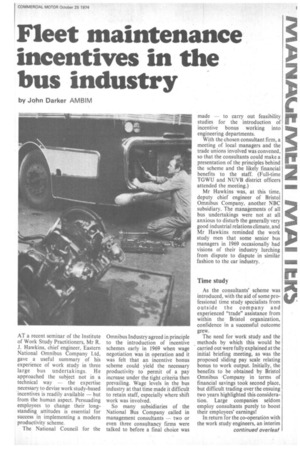Fleet maintenance incentives in the bus industry
Page 83

If you've noticed an error in this article please click here to report it so we can fix it.
by John Darker AMBIM
AT a recent seminar of the Institute of Work Study Practitioners, Mr R. J. Hawkins, chief engineer, Eastern National Omnibus Company Ltd, gave a useful summary of his experience of work study in three large bus undertakings. He approached the subject not in a technical way — the expertise necessary to devise work study-based incentives is readily available — but from the human aspect. Persuading employees to change their longstanding attitudes is essential for success in implementing a modern productivity scheme.
The National Council for the Omnibus Industry agreed in principle to the introduction of incentive schemes early in 1969 when wage negotiation was in operation and it was felt that an incentive bonus scheme could yield the necessary productivity to permit of a pay increase under the tight criteria then prevailing. Wage levels in the bus industry at that time made it difficult to retain staff, especially where shift work was involved.
So many subsidiaries of the National Bus Company called in management consultants — two or even three consultancy firms were talked to before a final choice was made — to carry out feasibility studies for the introduction of incentive bonus working into engineering departments.
With the chosen consultant firm, a meeting of local managers and the trade unions involved was convened, so that the consultants could make a presentation of the principles behind the scheme and the likely financial benefits to the staff. (Full-time TGWU and NUVB district officers attended the meeting.) Mr Hawkins was, at this time, deputy chief engineer of Bristol Omnibus Company, another NBC subsidiary. The managements of all bus undertakings were not at all anxious to disturb the generally very good industrial relations climate, and Mr Hawkins reminded the work study men that some senior bus managers in 1969 occasionally had visions of their industry lurching from dispute to dispute in similar fashion to the car industry.
Time study
As the consultants' scheme was introduced, with the aid of some professional time study specialists from outside the company and experienced "trade" assistance from within the Bristol organization, confidence in a successful outcome grew.
The need for work study and the methods by which this would be carried out were fully explained at the initial briefing meeting, as was the proposed sliding pay scale relating bonus to work output. Initially, the benefits to be obtained by Bristol Omnibus Company in terms of financial savings took second place, but difficult trading over the ensuing two years highlighted this consideration. Large companies seldom employ consultants purely to boost their employees' earnings!
In return for the co-operation with the work study engineers, an interim continued overleaf












































































































































